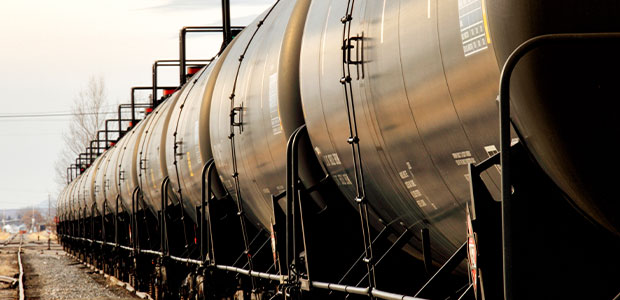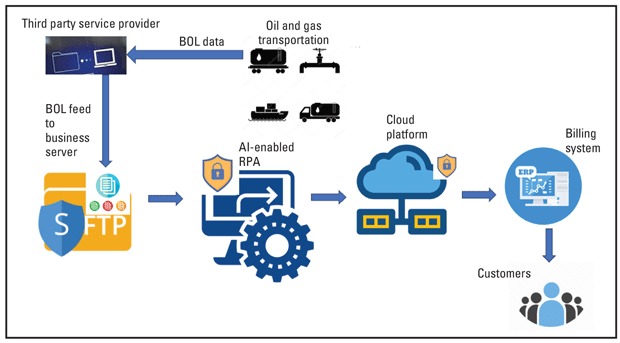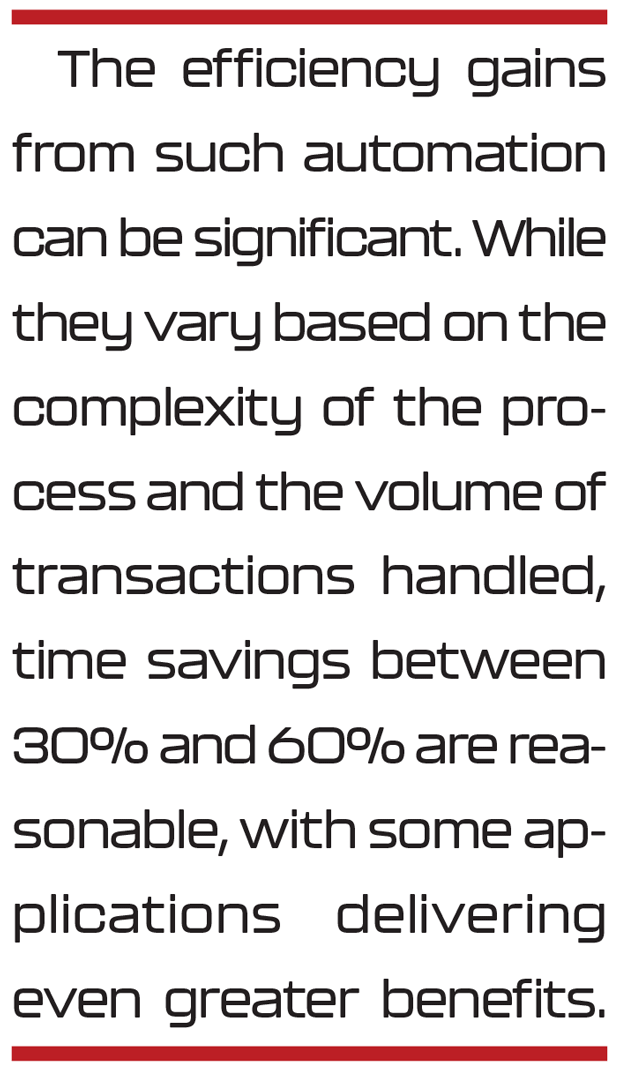
AI-Augmented Robots Boost Speed, Accuracy of Vital Billing Processes
By Suseela Veerappan
The business and market complexities associated with the oil and gas industry make billing processes challenging for companies across the sector. At their scale and scope of operations, many oil and gas entities are particularly plagued by material errors and over- and under-billing. Each incorrect invoice risks negative consequences that may extend beyond critical financial impacts to serious regulatory, supply chain, customer relationship and brand management problems.
Whether they focus on upstream, midstream or downstream operations, oil and gas organizations have a long history of seeking ways to optimize their vendor and customer billing processes. Today, one of the best steps toward that goal involves augmenting traditional robotic process automation (RPA) solutions, which rely on preprogrammed rules to perform predictable tasks, by adding artificial intelligence that allows the virtual robots to handle more complex situations.
By combining such intelligent RPA with cloud computing tools, oil and gas information technology teams now can effectively ensure security and integrity in interfacing between different platforms, making it possible to automate end-to-end billing processes while improving accuracy and customer satisfaction.
The efficiency gains from such automation can be significant. While they vary based on the complexity of the process and the volume of transactions handled, time savings between 30% and 60% are reasonable, with some applications delivering even greater benefits. The efficiency improvements come from automating previously manual tasks associated with entering and validating data, correcting errors and performing complex calculations.
Billing Complexities
The oil and gas industry billing process is multifaceted, involving numerous steps and complex scenarios. From acquiring relevant data from external customers and vendors, to creating various supply chain documents—such as purchase orders, sales orders, deliveries, shipments, proforma invoices, customer invoices, differential invoices and vendor invoice receipts—each stage presents its own challenges.
Factors such as product title transfer at the ship-to customer or the plant, temperature and density variations in the products sold, external price quotes incorporating environmental surcharges and discounts, tax calculations, exchange rate considerations for cross-border shipments, and batch management of products create further complications.
At a broader level, the process that begins with refining crude and extends to selling products at terminals can be classified as bulk and rack. As products are transported in various modes (such as rail, barge, vessel, pipeline and truck), they can undergo in-tank storage, mixed storage (depending on the compatibility of products), exchange of products, and gains and losses resulting from temperature changes and other environmental factors. Furthermore, operators often must manage several types of invoices to account for quantity conversions, pricing, cross-border obligations and various industry-specific factors. Hence, oil and gas invoicing can be difficult.
Modern AI and machine learning technologies have tremendous potential to address the many components that complicate oil and gas billing processes. Figure 1 illustrates how intelligent RPA, coupled with integration platforms, can mitigate these complexities and facilitate automatic billing with minimal manual intervention.
The workflow depicted in Figure 1 begins with the transportation of oil and gas, in which the bill of lading (BOL) feed for the commodity sold is transmitted through third party service providers to the business server.
The IRPA (or AI RPA) is an automation tool that can be configured to attend to repetitive tasks. AI and ML tools can be designed with algorithms to capture information from various formats, build in security as they convert metadata and make intelligent decisions. With proper programming, AI and RPA can eliminate laborious but common tasks that typically consume employee time, and thus have been subject to human error.
Automating these tasks yields both tangible and intangible benefits. In this process flow, the automated tools read the source BOL file, apply the algorithms, calculations and conversion logic to make suitable decisions, and then transform the source data to target file structures that meet different business processes as defined in the target billing system.
Generative AI, which creates new content from historical data, helps ensure accuracy and integrity. Because it evolves continuously as new data becomes available, it gets more reliable with time.
The Cloud’s Role
The cloud platform acts as an interface between the IRPA and the billing system. Cloud technologies can map the target file data to a predefined data structure, to be consumed by the billing system. In this process, data transmission between various applications complies with security and privacy requirements.
In the future, AI-infused cloud platforms that maintain data integrity increasingly will work alongside applications that allow subject matter experts to automate tasks with only the most basic understanding of programming. These “no code, low code” tools empower a much broader user base to streamline routine work so they can focus on particularly complex or novel issues.
Automation also is deployed in the billing system, which is likely built on one of the widely used enterprise resource planning (ERP) systems. The ERP system contains transactional data and produces invoices.
Complementing these distinct processes, IRPA is revolutionizing billing systems by leveraging AI and ML tools that process data at far faster speeds, and with far greater accuracy, than even the most capable humans. IRPA can transform many elements of the billing process.
Consider temperature and density calculations. In oil and gas, accurate temperature and density calculations are essential for billing accuracy. IRPA incorporates algorithms to perform volume calculations based on temperature and density variations, ensuring precise invoicing and minimizing discrepancies that sometimes result from human error. Regardless of the source, resolving such discrepancies can be frustrating and tedious.
Similarly, IRPA can handle quantity conversions. Oil and gas products are sold in various units of measure depending on the type of product and country standard measurements. With predefined conversion rules and formulas, IRPA can read the relationship between different units of measure in conjunction with temperature and density calculations, and thereby convert source volumes to target volumes with a high degree of accuracy.
IRPA also can help companies adjust to fluctuations in oil and gas prices. The AI-empowered virtual robots fetch pricing information from external sources, then prepare pricing files for direct integration into the billing system. This automation streamlines the pricing process, ensuring that billing accurately reflects current market conditions.
Data Extraordinaire
IRPA excels at ingesting data from various external systems quickly and accurately. For example, IRPA can retrieve external BOL invoicing data from a service provider’s portal based on built-in algorithms and predefined logic, eliminating the need for manual data entry and driving the invoicing automation process.
To protect data as it moves between and within external portals and business systems, the best AI and IRPA tools have been built to meet cybersecurity standards and support secure file transfer protocols. By employing AI-driven security measurements, IRPA also protects sensitive data from unauthorized access or manipulation. This attention to security lets users comfortably implement efficient and timely billing processes, reducing errors that typically occur with manual data processing.
Once the data is ingested, IRPA validates it against predefined business rules and enriches it by incorporating cross-reference data. That information includes maps of the relationships between customers, products, terminals, vendors and carriers, as well as temperature, density conversions, unit of measure conversions and country-specific data.
Depending on business needs, such validated and enriched data can be transformed into the various formats required by internal and external tools. One of the most common use cases involves transferring data to a billing system, which will use it to produce various documents, such as sales orders, deliveries, shipments and invoices, without incurring any data loss.
It’s worth emphasizing that automating validation and enrichment tasks with IRPA enhances data accuracy and integrity, laying the foundation for correct billing calculations.
Process Automation
After data validation, enrichment and transformation, IRPA handles repetitive and rule-based tasks to automate vendor and customer billing processes. IRPA’s natural design interface allows users to develop and deploy automation workflows rapidly, reducing dependency on manual interventions and accelerating billing cycles.
Robust exception handling mechanisms within IRPA support efficient, automated handling of errors and exceptions encountered during data processing. In situations such as data validation failures or system errors, IRPA provides configurable workflows to address exceptions promptly, minimizing disruptions and ensuring seamless processes.
Oil and gas companies that automate their billing processes with IRPA will benefit from distinct advantages that can have a positive impact on profitability, human resources, operations, marketing, and vendor and customer relations. These include enhanced accuracy and efficiency, streamlined workflows, real-time data synchronization and improved customer satisfaction.
Besides reducing manual interventions and related errors, automated data processing built on seamless, real-time data exchange between IRPA and secured cloud platforms accelerates billing process cycles, enables timely billing and invoicing activities, and generates accurate order fulfillment. Accurate and on-time billing improves cash flow and customer loyalty, creating a competitive advantage that can contribute to business growth.

SUSEELA VEERAPPAN is a senior SAP business analyst at Marathon Petroleum in San Antonio. As a solutions architect and project lead, she specializes in the oil-and-gas-specific functionalities of the SAP ecosystem, applying nearly two decades of information technology and project management expertise to bridge the gap between technology and business needs. Throughout her career, Veerappan has developed solutions and integrated processes to address industry-specific challenges, including ones related to refining and marketing sales, commodity pricing, supply chain optimization, logistics, domestic and importation requirements, taxes, billing and accounting. She is SAP-certified in generative AI and AI ethics, and is an SAP-certified application associate.
For other great articles about exploration, drilling, completions and production, subscribe to The American Oil & Gas Reporter and bookmark www.aogr.com.

















